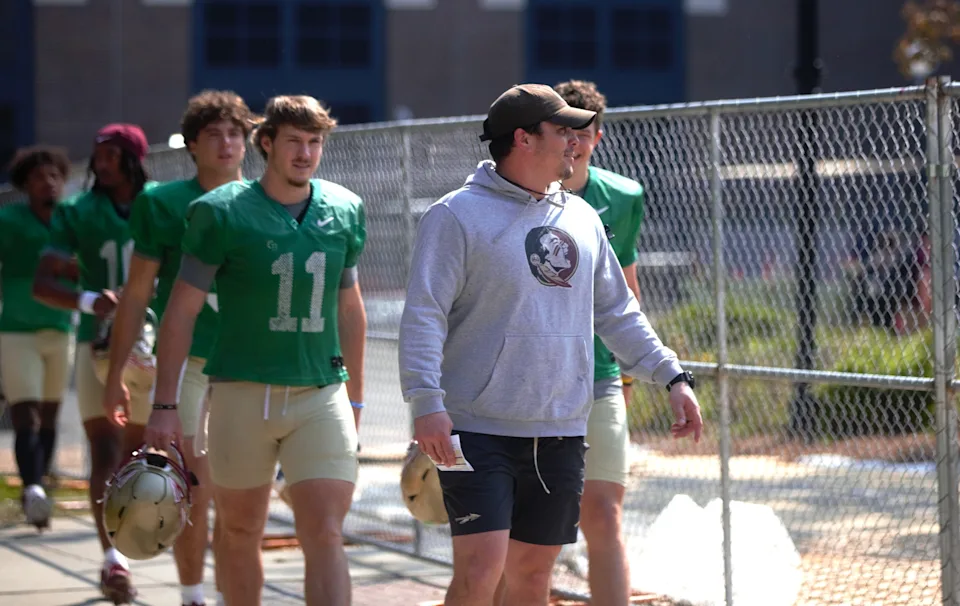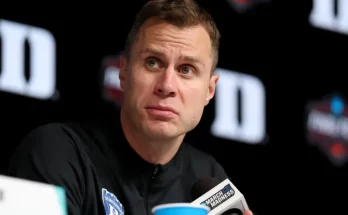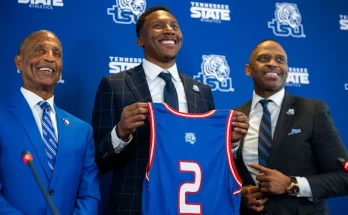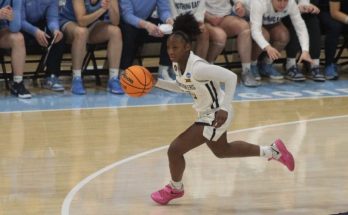Brock Glenn could have walked away. In an era of instant gratification, mass transfers, and high-stakes NIL offers, few would have blamed Florida State quarterback Brock Glenn if he had decided to test the waters elsewhere. The college football landscape no longer penalizes restlessness—in fact, it seems to reward it. But Glenn, still just scratching the surface of his potential, made a decision that bucks the trend. He’s staying in Tallahassee. And the reason is simple: he’s a competitor.
For a guy who’s spent most of his collegiate career in the shadows—first behind Jordan Travis and then amid a quarterback room suddenly filled with new faces—Glenn’s decision to stick it out with the Seminoles speaks volumes about his character, confidence, and long-term vision. In a time when loyalty is rare, Brock Glenn’s choice reflects an old-school mentality wrapped in a modern college football world.
It would’ve been easy to bail. After all, Florida State has been aggressive in reshaping its quarterback depth chart. D.J. Uiagalelei transferred in from Oregon State. Freshmen phenoms are knocking on the door. And the pressure to deliver on lofty expectations hasn’t gone anywhere. The Seminoles want to win now. But rather than interpret the influx of talent as a threat, Glenn saw it as an opportunity—a chance to prove he belongs, to fight for the job, and to earn his place the hard way.
And that, to understand it, takes looking back at the kind of quarterback—and person—Brock Glenn is.
Coming out of Lausanne Collegiate School in Memphis, Glenn wasn’t the most hyped signal-caller in his class, but his poise, intelligence, and feel for the game made him one of the more intriguing long-term projects. He had initially committed to Ohio State, only to flip to Florida State after the Seminoles made a late push. While some recruits are dazzled by immediate playing time or fancy facilities, Glenn was drawn to a challenge—and to a staff that believed in what he could become.
That chip on his shoulder didn’t go anywhere once he got to Tallahassee. Glenn knew he wasn’t walking into a situation where he’d be handed anything. Jordan Travis was the unquestioned starter in 2023, and the offense was built around his dynamic playmaking. Glenn’s role was clear: sit, learn, absorb. And he did. But fate has a way of thrusting players into the spotlight faster than expected. When Travis went down with a season-ending injury late in the year, the quarterback dominoes started falling.
Initially, it was Tate Rodemaker who got the nod. But a subsequent injury forced Florida State to turn to Glenn in the ACC Championship Game against Louisville. It was not an ideal situation for a true freshman making his first start. The offense was sputtering, the stakes were enormous, and the pressure was suffocating. Glenn looked every bit like a player still growing into the role. He completed just 8 of 21 passes for 55 yards and no touchdowns. The Seminoles managed to win the game 16-6, but it was clear they were winning in spite of the offense, not because of it.
Critics were quick to pounce. The College Football Playoff Committee controversially left Florida State out of the playoff, citing the offense’s decline after Travis’ injury. Glenn was thrust into a national narrative he didn’t ask for—and became the symbol of a perceived falloff. It would’ve been easy to let the noise bury him. Instead, he absorbed it and kept working.
“He’s the kind of kid who wants to be better every day,” one FSU staffer said this spring. “He didn’t take the criticism personally. He took it as fuel.”
Spring practice offered a new window into Glenn’s mindset. He didn’t sulk. He didn’t look over his shoulder. Even with Uiagalelei arriving as the presumed front-runner for the job, Glenn embraced the competition. Coaches praised his development—the footwork, the anticipation, the confidence in the pocket. His teammates noticed it too. There was something different about him. More vocal, more assertive, more in command.
That’s not to say the path is clear. D.J. Uiagalelei has played in massive games at Clemson and Oregon State. He has the experience, the arm, and the pedigree. And there’s no hiding that Florida State didn’t bring him in to sit on the bench. But that hasn’t fazed Glenn.
“Brock’s not the type to run,” head coach Mike Norvell said. “He’s going to compete. He wants to be great here, not somewhere else. That says everything you need to know about who he is.”
It’s a sentiment that echoes through the locker room. Players gravitate to Glenn’s underdog mentality. He’s not flashy, but he’s respected. He’s the kind of guy who wins over people by outworking them. Every rep in practice, every film session, every extra throw after hours—it’s all part of a process that Glenn fully buys into. He understands that growth takes time and that the best stories are the ones that take a little longer to write.
What separates Glenn from so many others is that he’s not chasing a shortcut. The transfer portal could have offered a quick fix. A chance to start somewhere smaller, rack up stats, and rebuild momentum. But Glenn has never been interested in the easy route. He wants to compete against the best and win the job the right way. That’s rare.
His decision also speaks to the culture Norvell is building at Florida State. For all the talk about the Seminoles missing the Playoff, or their disappointing performance in the Orange Bowl, the program’s foundation remains strong. Players like Glenn—who could leave but choose to stay—are a testament to that stability. The quarterback room might be crowded, but it’s filled with players who believe in the direction of the team. Glenn isn’t just betting on himself—he’s betting on Florida State.
And that belief isn’t unfounded. The Seminoles are still loaded with talent across the board. The offensive line returns key contributors. The receiver room, though losing Keon Coleman and Johnny Wilson, is replenished with depth and speed. Running back Lawrance Toafili is poised for a breakout year. The defense, anchored by young stars and seasoned veterans, remains one of the most complete in the ACC.
If Florida State is going to make another Playoff push in 2025, it will need consistency at the quarterback position. Uiagalelei might start the season as QB1, but Glenn’s presence ensures that competition will remain sharp. And should the Seminoles need to call on him again, he’ll be ready—battle-tested, wiser, and more prepared than ever.
There’s also the bigger picture to consider. Glenn isn’t just fighting for a job—he’s fighting for his future. The NFL may not be calling yet, but he’s building the habits and mental toughness that pro scouts covet. Patience, perseverance, and production matter. And Glenn is positioning himself to deliver all three.
There’s something admirable about a quarterback who’s willing to wait, willing to learn, and willing to compete even when the odds are against him. Brock Glenn is that kind of quarterback. He could have left. He could have given up. He could have hit the portal, found a team that needed a QB, and walked into a starting role. But he chose to stay and fight.
And maybe, just maybe, that decision will end up defining his legacy at Florida State. Not because he was handed the job. But because he earned it.
In a college football world spinning faster than ever, sometimes the most powerful move is to stand still and say, “I’m not done yet.”
Brock Glenn is still here. Still working. Still believing. Still competing.
And he’s not backing down.



